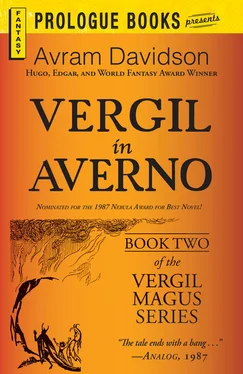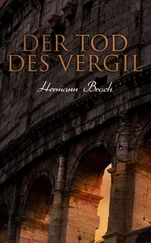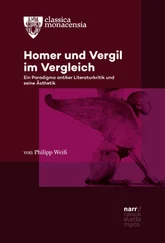Avram Davidson - Vergil in Averno
Здесь есть возможность читать онлайн «Avram Davidson - Vergil in Averno» весь текст электронной книги совершенно бесплатно (целиком полную версию без сокращений). В некоторых случаях можно слушать аудио, скачать через торрент в формате fb2 и присутствует краткое содержание. Жанр: Фэнтези, на английском языке. Описание произведения, (предисловие) а так же отзывы посетителей доступны на портале библиотеки ЛибКат.
- Название:Vergil in Averno
- Автор:
- Жанр:
- Год:неизвестен
- ISBN:нет данных
- Рейтинг книги:3 / 5. Голосов: 1
-
Избранное:Добавить в избранное
- Отзывы:
-
Ваша оценка:
- 60
- 1
- 2
- 3
- 4
- 5
Vergil in Averno: краткое содержание, описание и аннотация
Предлагаем к чтению аннотацию, описание, краткое содержание или предисловие (зависит от того, что написал сам автор книги «Vergil in Averno»). Если вы не нашли необходимую информацию о книге — напишите в комментариях, мы постараемся отыскать её.
Vergil in Averno — читать онлайн бесплатно полную книгу (весь текст) целиком
Ниже представлен текст книги, разбитый по страницам. Система сохранения места последней прочитанной страницы, позволяет с удобством читать онлайн бесплатно книгу «Vergil in Averno», без необходимости каждый раз заново искать на чём Вы остановились. Поставьте закладку, и сможете в любой момент перейти на страницу, на которой закончили чтение.
Интервал:
Закладка:
Most of the maps were transparencies: very difficult to prepare. Some were on membrane, some on parchment scraped very thin, a devilishly hard thing to achieve the right degree of thinness and yet make no hole. He had, as an experiment, made one on that cloth — translucent, pale, and strong — purchased in the foreign shop. And some few others were on that new and wonderful kind of papyrus which, made all in one piece and sheet, unlike the cross-strips of common papyrus that were glued and pressed together, offered one single complete flat surface every single part of which might be writ upon; this had come from some source unknown, far along the Great Silk Road. It was not as costly as silk but it was to Vergil’s mind incomparably more utile.
“And so now, Master Wizard. Please show. Explain. Advise.”
From somewhere in the gathering came a sole grumble. “What need? Hecatombs.” And, again, that slower, grumbling repetition of “Hec-a-tombs …”
With the belief that all the problems of the shifting, waning natural fires of Averno might be solved by sacrificing oxen in hundreds to Demogorgon, Vergil had no desire to argue. Religion could be sometimes, not often, was, a touchy subject. What else should he do now? Invite the magnates to leave their chairs or couches and come gather round the table? Had there been but a few, this is exactly what he would have done. But there were too many. And then. . too. . he felt, somewhat. . well, truthfully. . more than somewhat. . that he had been disparaged. They looked upon him, it seemed, as some mere hawker of trifles, one whose peddler’s pack might be removed from his quarters and glanced over in their own, at their leisure and their pleasure. Again he asked himself, was it for this that he had made that long, long and more than circuitous journey “from Sevilla to Averno”? Well. Let them see who else and what else he was and might be. And what he could do.
A long way from Sevilla to Averno; yes it was. And it was a long race they had run on that one certain day there, in the Second Secret School. There was no business of: present your thesis, declaim your thesis, defend your thesis, pay your fee, receive your gold ring, your hood, and all the rest of that. Vergil had done that, of course, done all of that. Later. Elsewhere. Hence, Master Vergil.
But not in Sevilla. In Sevilla, on that one certain day, they had done none of that.
Out had come the duumvirs of the School: Calimicho, the gray, the gaunt, the grim; and Putto, the obscenely fat. With voices so in unison that absolutely what was heard was in effect one voice, they two then had called, in ringing tones (literally, the tones had rung, as though two bells, one bass and one treble, had sounded with insistent, consistent precision), “Leave that which you are now doing, and leave it undone. There comes now the last lesson, now, now, now” (bell, bell, bell); “the final test, the last ordeal, and then the time of payment. You are to run now the Petrine Race.” Half, the students shuddered; half, they cast eyes about to see whence, if, they might escape, knowing every one of them at once that escape there could be none: either victory or. . not death. Certainly not. Not altogether, death. (What, they knew not. Not at all.) Calimicho flexed his rope-wire limbs; who, the gods! could hope to outrun Calimicho? Putto took a few ponderous waddling-quaking steps to one side, as though the better to position himself to see the race from vantage best, Calimicho made an odd gesture; sun-rays appeared.
“Take ten steps backward….” The students did. “At the count of four: Turn. Run. One.
“Two.”
Every eye was on Calimicho.
“Three.”
Calimicho was not there.
“Four. Turn. Run.”
It is said that inside every fat man there is a thin man, struggling to get out. Vergil had heard it said a hundred times. Suddenly he had known that, in this at least one case, it was no mere saying. Between the word Four and the word Turn, Putto had split open. That monstrous carapace of folds and fat simply fell, asunder, on the pitted floor: there stood for that one second’s fraction before their horrified eyes someone young and slim and strong and naked, oiled and dusted red as any athlete “waiting for the trumpet beneath the portico.” Who gave — once — that same inhuman scream that Vergil had heard but once before. What came instantly next was not the trumpet but the word Turn: They needed it not, they would have turned, so total was their terror, had no word come, and — Run …? Probably none of them could afterward have said if or not he had actually heard that command pronounced; of course they had run.
Ahead of them at the far end of that suddenly sunlit hall there stood Calimicho, gray and gaunt and grim. Toward him they ran, not knowing for certain sure what he would do to any of them when they reached him, but pausing in no way to wonder, they, racing, ran.
And the runner, slim, who had all this while been embodied inside of Putto — ah, how fat! and now one knew why! — this runner, racing, ran behind them.
Ran, that is, behind all but one of them.
Somehow, Vergil himself knew then not how, by what twist of his body and his mind and the light and. . or …
Vergil ran behind the one who ran who had been hidden, all this while, inside of Putto, the obscenely fat.
Vergil’s mind and matter were all intent against some sudden stop and turnabout on this runner’s part, he did not concentrate at all on what the other students were doing: who was first, who neck-and-neck, who this or who that; but half-dimly he did note one who was running quite a number ahead of last, a Thracian, thick and swart and strong; they had not called him by his half-forgotten name, but “Thrax” they had called him; it befell that Thrax made the dread mistake as Orpheus and one other: Thrax turned and looked behind. Thrax stumbled. Thrax did not fall, but Thrax had lost his place. Calimicho stepped forward as Thrax raced frantic across the slanting sunlights on the pitted floor, Calimicho snarled a single word, Calimicho stamped down his foot as one would upon a snake but it was no snake down upon which came his stamping tread, it was on Thrax’s shadow. Thrax yet ran hard panting one more second fore, the shadow parted from his frantic feet with a sound so strange and horrid Vergil hoped ne’er to hear it ever again or more.
A frightful sound.
But not so frightful, was it —? More frightful, was it —? the frightful shriek of Thrax, which he uttered even before he knew the cause of this swift-sudden and never-felt-before, never-to-be-free-from more, unknown and dreadful pain. Thrax stumbled again. Calimicho seized the severed shadow up from where it lay flopping and writhing on the floor; Calimicho, by some trick no wrestler Vergil had ever seen do, Calimicho threw the shadow up and caught the nape of it between his teeth: ah, Calimicho’s most frightful grin! And, holding it thus secure between his clenching teeth, he turned and twisted and tied it fast. Then he folded it, still asquirm, still flapping, and he placed it in his sack. And tied one knot with his thong of human skin (it had a tuft of human hair upon each end of it).
All knew, ah! that sack of gaunt Calimicho’s! Many a thing they had seen go into it, but not one had they ever seen go out.
By now even Thrax knew what had happened.
By now the nameless runner had slacked his pace, the race was done, he allowed himself a glance at Vergil as he, the unnamed runner, cantered on at an angle before finally coming to a stop. The dust was red upon his oiled and sweaty limbs, odd blue-green was the eye with which he gave Vergil a single glance. Thrax began again — for he had for one second ceased, and gasped, and began again to scream. He flung himself upon the pitted floor a-front of Calimicho, his back heaving; repeatedly he raised his head and as he gibbered and drooled repeatedly he bowed it down again and banged it before Calimicho; soon, the gibbering became words: “Ruler, Augur, Satrap, Lord. . my shadow. . shadow. . shadow …”
Читать дальшеИнтервал:
Закладка:
Похожие книги на «Vergil in Averno»
Представляем Вашему вниманию похожие книги на «Vergil in Averno» списком для выбора. Мы отобрали схожую по названию и смыслу литературу в надежде предоставить читателям больше вариантов отыскать новые, интересные, ещё непрочитанные произведения.
Обсуждение, отзывы о книге «Vergil in Averno» и просто собственные мнения читателей. Оставьте ваши комментарии, напишите, что Вы думаете о произведении, его смысле или главных героях. Укажите что конкретно понравилось, а что нет, и почему Вы так считаете.












